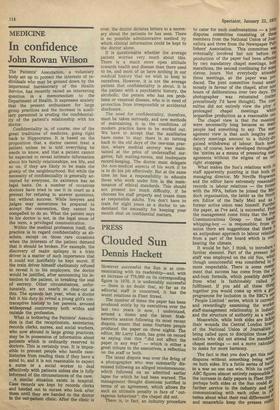MEDICINE
In confidence
John Rowan Wilson
The Patients' Association, a voluntary body set up to protect the interests of individuals who may be ground down by the impersonal bureaucracy of the Health Service, has recently raised an interesting question in a memorandum to .the Department of Health. It expresses anxiety that the present enthusiasm for large group practices and the increase in auxil iary personnel is eroding the confidentiality of the patient's relationship with his doctor.
Confidentiality is, of course, one of the great traditions of medicine, going right back to Hippocrates. It is based on the proposition that a doctor cannot treat a patient unless he is told everything he needs to know, and that a patient cannot be expected to reveal intimate information about his family relationships, sex life, and so on, if they are likely to be made the gossip of the neighbourhood. But while the necessity of confidentiality is generally accepted by everyone, its existence has no legal basis. On a number of occasions doctors have tried to use it in court as a pretext for refusing to answer questions, but without success. While lawyers and judges may sometimes be prepared to accept the convention, they cannot be compelled to do so. What the patient says to his doctor is not, in the legal sense of the term, a privileged communication.
Within the medical profession itself, the practice is to regard confidentiality as absolute, except on those rare occasions when the interests of the patient demand that it should be broken. For example, the discovery of major epilepsy in a train driver is a matter of such importance that it could not justifiably be kept secret. If the train driver himself obstinately refused to reveal it to his employers, the doctor would be justified, after announcing his intention to the patient, in breaking the seal of secrecy. Other circumstances, unfortunately, are not nearly so clear-cut as this. The episode last year, when a doctor felt it his duty to reveal a young girl's contraceptive history to her parents, aroused widespread controversy both within and outside the profession.
What is bothering the Patients' Association is that the receptionists, secretaries, records clerks, nurses, and social workers, who now abound in large group practices, may be in possession of information about patients which is ordinarily reserved to doctors. This is certainly true. It is impossible to prevent people who handle casehistories from reading them if they have a mind to, and it is not reasonable to expect a nurse or a social worker to deal effectively with patients unless she is fully informed of the circumstances of the case.
A similar situation exists in hospital. Case records are kept by records clerks and handed out to nurses who look after them until they are handed to the doctor In the out-patient clinic. After the clinic is over, the doctor dictates letters to a secretary about the patients he has seen. There is no possible administrative method by which clinical information could be kept to the doctor alone.
It is questionable whether the average patient worries very much about this. There is a much more open attitude towards health and disease than there used to be, and most of us have nothing in our medical history that we wish to keep to ourselves. However, it is not the average patient that confidentiality is about. It is the patient with a psychiatric history, the alcoholic, the person who has sex problems or venereal disease, who is in need of protection from irresponsible or accidental disclosure.
The need for confidentiality, therefore, must be taken seriously, and new methods of maintaining it in the conditions of modern practice have to be worked out. We have to accept that the auxiliaries have come to stay: there is no turning back to the old days of the one-man practice, where medical secrecy was maintained at the price of understaffed surgeries, full waiting-rooms, and inadequate record-keeping. The doctor must delegate the non-medical aspects of his work if he is to do his job effectively. But at the same time he has a responsibility to educate those who work under him in the maintenance of ethical standards. This should not present too much difficulty, if he chooses his staff properly and treats them as responsible adults. You don't have to train for eight years as a doctor to understand the necessity for keeping your mouth shut on confidential matters.










































 Previous page
Previous page